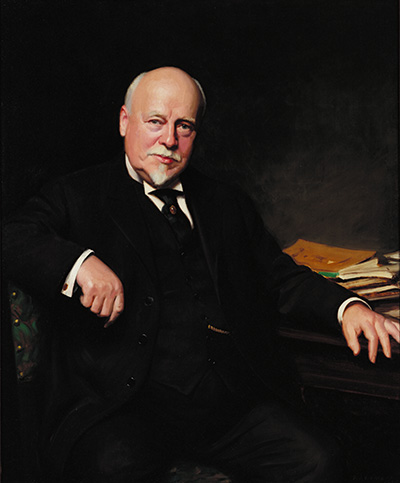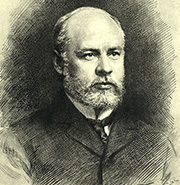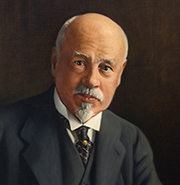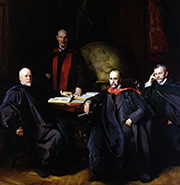William Henry Welch

William Henry Welch
- Artist:
- Thomas C. Corner
- Date:
- 1920
- Medium:
- Oil on canvas
- Dimensions:
- 43.5 x 35.5 in.
William Henry Welch
1850-1934
Welch, known as the dean of American medicine, was born in Norfolk, Connecticut. He received his A.B. from Yale University in 1870 and his M.D. from the Columbia University College of Physicians and Surgeons in 1875. After interning at Bellevue Hospital in New York, Welch studied at universities in Strasbourg, Leipzig, Breslau, and Berlin from 1876 to 1878.
Returning to Bellevue Hospital Medical College, Welch held an appointment as professor of pathological anatomy and general pathology. While there, he established the first pathological laboratory and discovered the organism named Bacillus Welchi that causes gas gangrene. He also conducted significant research in a number of other areas, including diphtheria, pneumonia, and problems related to immunity and infection.
In 1884, Welch was appointed the first faculty member of the Johns Hopkins University School of Medicine, and recruited its founding faculty. In 1887, he launched the pathological laboratory, the first building of The Johns Hopkins Hospital to open. He was named pathologist-in-chief when the hospital officially opened in 1889. The Johns Hopkins University School of Medicine opened in 1893 with Welch as its first dean. Later in 1916, he helped organize the Johns Hopkins University School of Hygiene and Public Health and became its first director. Welch also founded and served as the first director of the Institute of the History of Medicine at The Johns Hopkins University.
In 1896, he founded the Journal of Experimental Medicine. Welch was elected president of the Congress of American Physicians and Surgeons in 1897 and president of the Maryland State Board of Health from 1898 to 1922, serving on its board until 1929. He was president of the American Association for the Advancement of Sciences in 1907 and of the American Medical Association in 1910. From 1913 to 1916, Welch served as president of the National Academy of Sciences.
His influence also extended to the military, where he became one of the chief advisors to the U.S. Army’s medical department. Welch took an active role in national and international medical affairs. He served as president of the board of directors of the Rockefeller Institute for Medical Research from 1901 to 1932. During this time, he was an advisor to John D. Rockefeller, who funded the establishment of the Peking Union Medical College. Welch helped set the goals for this western-style medical school, modeled on Johns Hopkins’ focus on research, premedical teaching, and clinical training.
During his lifetime, Welch received widespread national and international recognition. His awards included eighteen honorary degrees, the Order of the Royal Crown in Germany, and the Order of the Rising Sun in Japan. In addition, he was presented with the National Institute of Social Services Gold Medal, the U.S. Army Distinguished Service Medal and Citation, and the Kober Medal of the Association of American Physicians. Welch also received the Gold Medal of the American Medical Association and the Harben Plaque for Public Health Service from the Royal Institute of Public Health. The medical library of The Johns Hopkins University was named in his honor upon its opening in 1929.
Film clip: Reminiscences of the early days of the medical school / by William H. Welch. 1932.
Additional Portrait(s) of William Henry Welch
"*" indicates required fields



